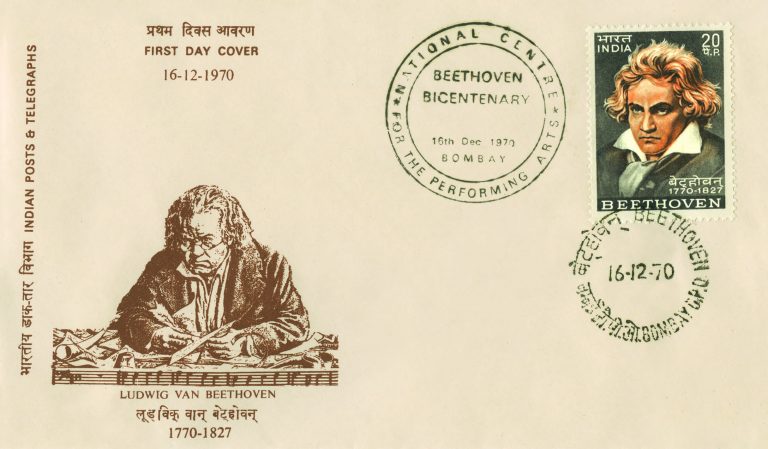India has been in the vanguard of nations that have honoured, through commemorative postage stamps, not only her own great sons and daughters, but also those eminent citizens of other countries who have contributed to the wisdom, peace and happiness of mankind.
In 1970, the National Centre’s Trustee-in-Charge, Dr. Jamshed Bhabha, proposed to the Union Ministry of Communications that India, which had brought out stamps featuring Franklin Delano Roosevelt, Maxim Gorky, and great citizens of other countries, should issue a stamp in honour of Ludwig van Beethoven on the bicentenary of his birth. While this suggestion was sympathetically received, the response to it was negative, at all levels from the Secretary, the Minister of State and the Cabinet Minister concerned, on the ground that the Nasik Security Press which printed India’s postage stamps was overloaded with work on other stamps and could not take on a single additional assignment. Music lovers and all those who believe that humanity’s ideals and noblest sentiments are enshrined in the arts, will be grateful to Prime Minister Indira Gandhi for intervening at that juncture to ensure that India joined other nations in paying her tribute to Beethoven, a supremely great creative genius who, convinced of the final triumph of the human spirit, wrote, “Music must create and fan the fire of humanity”.

The commemorative stamp and First Day Cover in Beethoven’s honour, released in Bombay at a function organised at the NCPA, were designed by the National Centre’s Trustee-in-Charge. For the postage stamp, he chose a portrait of Beethoven in his early prime at about the time he composed his revolutionary Third Symphony, the Eroica. For the First Day Cover, he chose a picture of Beethoven in his last years, at about the time when, stone-deaf, he composed his glorious Ninth Symphony. In the original artwork, titled ‘Beethoven nears the end’ by Batt, the composer is depicted in his workroom in the old Schwarzspanierhaus. Behind him stands his Graf piano, wrecked by his frantic efforts to hear his own playing. On the table are his ear-trumpets and conversation books in which any visitor would have to write what he wished to ask or say. The squalid disorder meant nothing to him in those days. He had finished with the world, since 1824 the medium of the string quartet had absorbed his mind, and now, stone-deaf, very ill but still indomitable, he rose to heights he had never reached before. His stormy life closed with a revelation which, in the last five quartets, was the crowning glory of his supremely great achievement.
This piece was originally published by the National Centre for the Performing Arts, Mumbai, in the June 2019 issue of ON Stage – their monthly arts magazine.




